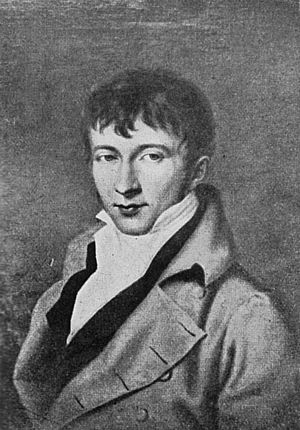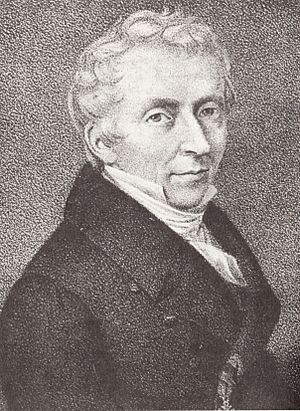Adam Müller facts for kids
Quick facts for kids
Adam Müller
|
|
|---|---|

Adam Müller in his youth
|
|
| Born |
Adam Heinrich Müller
30 June 1779 Berlin, Brandenburg
|
| Died | 17 January 1829 (aged 49) |
| School or tradition |
|
| Influences | |
| Contributions | Criticism of Adam Smith's economic theory |
Adam Heinrich Müller (born June 30, 1779 – died January 17, 1829) was a German-Austrian thinker. He was a conservative philosopher, a writer who reviewed books, and an expert in how countries manage their money (a political economist). He was part of the Romantic movement, which focused on feelings and nature. After 1827, he was known as Ritter von Nitterdorf.
Contents
Adam Müller's Life Story
Early Years and Education
Adam Müller was born in Berlin. His family wanted him to study to become a Protestant minister. But in 1798, he chose to study law, philosophy, and science at the University of Göttingen. One of his teachers was Gustav Hugo.
When he returned to Berlin, his friend Friedrich von Gentz convinced him to study political science. Gentz was 15 years older and greatly influenced Müller's life and ideas. Even though they had different personalities, they agreed on their political goals. Their friendship lasted until Gentz's death.
Müller worked for a short time in Berlin. However, his connections with the Junker party (a group of powerful landowners) and his opposition to the reforms of Karl August von Hardenberg made it hard for him to get a public job in Prussia. He traveled to Sweden, Denmark, and Poland.
Moving to Vienna and New Faith
Later, Müller moved to Vienna. There, he changed his religion and became a Catholic on April 30, 1805. Through his friend Gentz, he met Metternich, a very important statesman. Müller helped Metternich prepare official government papers.
After his travels, Müller went to Dresden. In 1806, he gave talks about German science and literature. These talks showed he followed the Romantic ideas of Schlegel.
Career and Political Ideas
From 1806 to 1809, Müller lived in Dresden. He helped educate Prince Bernhard of Saxe-Weimar. He also gave lectures on German literature, theater, and political science. In 1808, he worked with Heinrich von Kleist on a magazine called Phoebus.
In 1809, he went back to Berlin. Then in 1811, he returned to Vienna. There, he lived with Archduke Maximilian of Austria-Este and became friends with Clemens Maria Hofbauer.
Müller developed his main political ideas in his lectures from 1808-1809. He published these ideas in a book called The Elements of Statecraft in 1809. He believed that a "state scholar" should support the leaders of the country. He promoted the ideas of political Romanticism.
He disagreed with the modern idea that the state is formed by a contract. Instead, he believed in an "organically grown" state led by a king, which combined old traditions with new ideas. He also strongly criticized the economic ideas of Adam Smith. Müller believed that property should be strictly tied to social bonds. He often said that the state is not just a business or a factory. He saw it as a deep connection of all needs and wealth, creating a strong, living whole.
Return to Berlin and Opposition
In 1809, Müller married Sophie von Haza-Radlitz. They moved to Berlin, where he gave more talks on history and politics. He also wrote articles for the Berliner Abendblatt newspaper (1810-1811), which was edited by Heinrich von Kleist.
Müller worked again for the Prussian government. But he did not like the reforms of Karl August von Hardenberg, who was the state chancellor. Müller tried to start a public discussion about these reforms through his articles. In 1811, he also advised Friedrich August von der Marwitz, a leader who opposed the government. However, Hardenberg stopped the opposition. Marwitz was put in prison, the newspaper closed, and Müller was sent to Vienna as a diplomat.
When war forced him back to Berlin, Müller wrote a strong complaint against Chancellor von Hardenberg. He did this after Hardenberg refused to give him a job. In this complaint, Müller accused the chancellor of having revolutionary ideas.
Later Career in Austria
In 1813, Müller joined the Austrian government. He became an imperial commissioner and a major in the rifle corps in Tyrol. He fought in the wars for liberation. Later, he helped reorganize the country as a government counselor. In 1815, he was called to Vienna and went to Paris with the imperial staff.
After peace was made, he became the Austrian consul-general for Saxony in Leipzig. He also worked as an agent for Anhalt and Schwarzburg. In Leipzig, he edited two magazines: Deutscher Staatsanzeiger (1816–1818) and Unparteiischer Literatur- und Kirchenkorrespondent.
He attended important meetings in Carlsbad and Vienna (1819–1820). There, he helped create the Carlsbad resolutions, which were strict rules to control political unrest. In 1826, Prince von Metternich helped him become a noble, and he was given the title Ritter von Nittersdorf. He was called back to Vienna in 1827 and became an imperial counselor. He worked for the chancellor's office. Adam Müller died in Vienna in 1829 at the age of 49.
Adam Müller's Ideas and Theories
Müller was a talented writer who wrote about politics, money, literature, and art.
The Elements of Statecraft
His most important work is Elemente der Staatskunst (Elements of Statecraft). This book came from lectures he gave in Dresden in 1808-1809. It talks about the state, laws, money, and how the state relates to religion.
Müller was a conservative writer. He believed the state should have strong, absolute power. This was different from thinkers like Montesquieu and Rousseau, who focused on the rights of man (human rights). Müller tried to connect political and social ideas. He used historical facts but also based his ideas on philosophy and religion. He was a major opponent of revolutionary ideas, along with Edmund Burke and Joseph de Maistre.
In his work, Von der Notwendigkeit einer theologischen Grundlage der gesamten Staatswissenschaften (On the necessity of a comprehensive theological foundation for political science, 1820), Müller disagreed with separating constitutional and civil law (common law). He thought this separation made the state too powerful. His ideal was the medieval system of feudalism, where society was organized with lords and vassals. He believed modern political systems should be based on this old model.
Romanticism and Aesthetics
In literature and art, Müller belonged to the Romantic school. He even applied Romantic ideas to politics and money. As the writer Joseph von Eichendorff said, Müller "mapped out a domain of his own, the application of Romanticism to the social and political conditions of life." Müller himself stated that his goal was to bring together science, art, and serious political life.
Economic Views
Müller's place in political economy (the study of how countries manage their money) is marked by his strong disagreement with Adam Smith's ideas. Smith's system focused on material wealth and individual freedom (often called classical political economy or the industry system). Müller criticized Smith for focusing too much on material things and individuals. He also thought Smith's views were too focused on England.
Müller was against free trade. Instead of focusing on individual wealth, he emphasized the moral side of a country's economy. He believed the state had a duty to help individuals, and that religion was important in this area too. Even those who disagreed with his religious and political views recognized his importance in economic history. Some of his ideas, made simpler, were later used by the historical school of German economists.
One of Müller's key contributions to economic theory was his book "Versuch einer neuen Theorie des Geldes" (Attempt at a New Theory of Money), published in 1816. In this book, Müller argued that paper money was better than metal money. He believed that the "word" or stamp on something is what makes it money, not the value of the material it's made from. Müller called this "ideal money."
Müller's ideas, which favored old systems like feudalism, did not fit well with the changing times. This prevented his political ideas from having a bigger impact during his life. However, his teachings had long-term effects. Later thinkers, like Othmar Spann, used his ideas when developing theories about corporatism (where society is organized into groups based on common interests).
Adam Müller's Writings
Müller is seen as the main figure of political Romanticism. His writing style often mixed enlightened ideas with Romantic ones. This was especially clear in his economic book Elements of Statecraft. In this work, he looked at the ideas behind wealthy nations. He explored how they could use their wealth to help everyone in society and create a fair world. A key part of this was his criticism of liberalism and the writings of Adam Smith. Müller's philosophy started with his "theory of opposites," which was an early form of dialectic thinking focused on finding balance.
Müller was a very talented person, a great speaker, and an inspiring writer. Many of his works came from his lectures. The most important ones (besides the magazines he edited) include:
- Die Lehre vom Gegensatz (The Doctrine of Contrasts, Berlin, 1804)
- Vorlesungen über die deutsche Wissenschaft und Literatur (Lectures on German science and literature, Dresden, 1806)
- Von der Idee der Schönheit (On the idea of beauty, lectures; Berlin, 1809)
- Die Elemente der Staatskunst (The Elements of Statecraft, lectures; 3 parts, Berlin, 1809)
- Über König Friedrich II. und die Natur, Würde und Bestimmung der preußischen Monarchie (lectures; Berlin, 1810)
- Die Theorie der Staatshaushaltung und ihre Forschritte in Deutschland und England seit Adam Smith (The theory of state budgeting, 2 vols., Vienna, 1812)
- Vermischte Schriften über Staat, Philosophie und Kunst (2 vols., Vienna, 1812)
- Versuch einer neuen Theorie des Geldes, mit besonderer Rücksicht auf Großbritannien (Attempt at a new theory of money, Leipzig, 1816)
- Zwölf Reden über die Beredsamkeit und deren Verfall in Deutschland (Twelve speeches on eloquence and its decline in Germany, Leipzig, 1817)
- Die Fortschritte der nationalökonomischen Wissenschaft in England (Leipzig, 1817)
- Von der Notwendigkeit einer theologischen Grundlage der gesamten Staatswissenschaften und der Staatswirtschaft insbesondere (Of the need for a theological basis for all political science, Leipzig, 1820)
- Die Gewerbe-Polizei in Beziehung auf den Landbau (Leipzig, 1824)
- Vorschlag zu einem historischen Ferien-Cursus (Vienna, 1829)
See also
 In Spanish: Adam Müller para niños
In Spanish: Adam Müller para niños
 | Stephanie Wilson |
 | Charles Bolden |
 | Ronald McNair |
 | Frederick D. Gregory |


